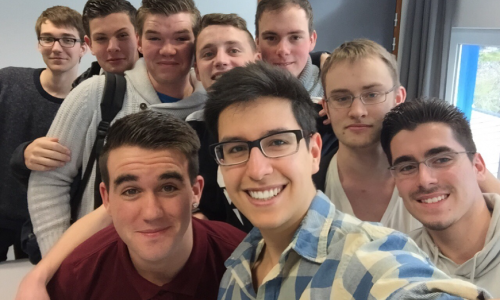
Career Fairs can be a great opportunity to learn more about potential career paths, what employers are looking for, and to do some general networking. Although they’re typically lower stress and less formal than an official interview, that doesn’t mean you should walk into one unprepared.
Here’s 10 tips on preparing for your next career fair so you can make the most of your time and leave the best first impression.
1. Pre-Register
Depending on the popularity, some career fairs have limited spots. Register as soon as you know you’ll be attending. Most fairs will also send out emails with updates on employers and tips on how to make the most of the fair.
2. Dress Appropriately
Dress professionally, like you would for an interview, but keep in mind that it could be a long day in a warm space. Keep it professional, but stay comfortable. Consider wearing a suit, or a nice blazer with dress pants or a nice skirt. Make sure whatever you choose is clean and wrinkle free. Ladies, consider shorter heels or flats since you could be on your feet all day. Read more in our Working with Grace series.
3. Do Your Homework
Most career fairs will have a list of participating companies available well in advance, take the time to research them. You don’t have to be an expert on every single one, but pick several that look the most promising (and this doesn’t mean just pick the most well-known names) and learn about their products, goals, mission statement, and company culture. Find out where they stand in their industry, and what problematics they’re currently facing. Read any recent news articles or press releases, even if they’re fairly small developments they can serve as an icebreaker and show you’ve done your research. You may not be able to use all of this information right away, but knowing the basics will leave a great impression, and can help you decide if it’s even an organization you’d be suited for.
4. Bring Supplies
Ideally you’ll have some business cards to hand out, but if not bring a resume and portfolio. Business cards should include your name, contact info (use a professional sounding email, like yourname@gmail or your SFU address, not funkymonkey37@aol), and links to any relevent online profiles or portfolios.
Having already done your homework you should know something about some of the companies, so create customized resumes for your top choices. Also bring a generic set, but if you’ll be applying for distinctly different type of jobs bring sets tailored for each sector. Some employers prefer online applications to paper resumes, so you may have an opportunity to further fine-tune your resume before you submit after the fair.
As for your portfolio, you most likely won’t be asked for it, but it’s always better to have it than to not. Make sure to read up on what to put in your portfolio, and how to present it. Finally, don’t forget to bring a pen!
5. Strategize Your Approach
If you’re attending a large career fair, you likely won’t have the time or energy to talk with every recruiter. Good thing you did your research in step 3, and you’ve selected some favorites and eliminated some options. Prepare a short ‘A’ list of employers that you have to speak with (if they’re big names try to beat the crowd and get to their table early), a ‘B’ list of who’d you’d like to see, and a list of places to swing by if you have time after that. If the crowds die down before you need to leave also consider returning to any favorites to thank them again for their time. Of course, if anyone else looks particularly interesting you may have to adapt your game plan. (If you need to outline an elaborate battle plan with maps and paper cut outs yourself the night before then by all means go ahead.)
6. Introduce Yourself
Don’t be scared to approach recruiters. You’re the reason they’re there. Greet the employer with a firm handshake and friendly smile. If you’re not feeling completely confident yet read up on perfecting your networking skills.
Sometimes there may be companies attending that you’re interested in that weren’t listed or you just didn’t see, and therefore are unprepared for. If you can, try to grab a brochure to study before returning to speak with someone; do some quick research on your smartphone; or discreetly listen in on a recruiter giving another attendee the run down. If all else fails, mention the pleasant surprise at their presence when you introduce yourself.
You may not think you’re qualified to work with a certain company, and at this fair they may only be looking for certain skill sets you just don’t have, but if you’re passionate about a them anyway, then don’t be afraid to introduce yourself, explain your intended career path and see if they can put you in touch with the right person.
7. Prepare an “Elevator Pitch”
Every screenwriter in Hollywood has a 30-second version of the pitch they’re working on, basically if you meet someone going into an elevator with you it’s what you pitch them before they get to their floor. While I’m sure your idea for a zombie rom-com is fantastic, here you’re better off sticking to the basics:
-
Full name
-
Major and any concentrations or specialized programs
-
Expected graduation or availability date
-
Key strengths (try to relate this to something you learned about the company)
-
Relevant experience
-
Type of work you’re interested in
-
A question to continue the conversation
While you want to sound prepared, you don’t want to sound like an overly rehearsed robot; know your general script, but keep it natural.
8. Prepare Questions
If you’ve done your homework you should be able to prepare some well-informed questions. If you need to, write them on a cue card and look them over before you approach the table.
Potential Questions:
-
Does your company hire continually or seasonally?
-
What kind of entry-level positions are typically available with your company?
-
What are the advancement opportunities within the company?
-
How would you describe the company culture?
-
Does your company use software programs to sort through resumes? (Very useful if they ask you to submit an online application, you can fine-tune your resume for screening software)
9. Leave on a High Note
As much as you may be able to speak with recruiters for hours, be mindful of their time. There are probably a lot of other people waiting to speak with them. Before you leave, thank them for their time, offer them your resume or business card if you haven’t already, and make sure you have some sort of contact information.
10. Follow-Up
If you made a connection at the fair then make sure you follow up within a couple of days. Send a short email reminding them who you are and thank them for their time. Make sure to include your contact information as well.














